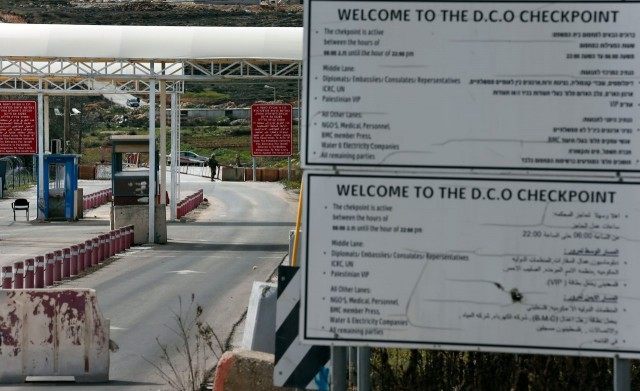Israel restricted access Monday into and out of the Palestinian political capital of Ramallah on the occupied West Bank after a checkpoint shooting that wounded soldiers, stepping up its response to attacks.
It was the first time such a step was taken by Israel since the wave of Palestinian attacks began in October, according to Israeli media.
The move kept commuters from leaving or exiting the West Bank city and led to frustration as lengthy queues formed in some areas.
It also applied to foreigners, although United Nations officials, international NGOs and diplomatic staff were exempted, diplomatic and UN sources said.
The army said only residents of Ramallah were being allowed in, while non-residents were permitted to leave.
A military source said greater emphasis was being placed on checking those exiting, while indicating he did not expect the restrictions to be in place for an extended period.
It was not clear when the last time such a move had been taken by Israel, though heavy restrictions were put in place during the second Palestinian intifada, or uprising, between 2000 and 2005.
AFP journalists reported that enforcement of the measures varied signficantly. Checkpoints near Jerusalem remained open and appeared to be operating normally.
Sunday’s attack saw a Palestinian who had worked as a guard for the attorney general’s office in Ramallah open fire at a checkpoint outside the city, wounding three Israeli soldiers before being shot dead.
It was part of four months of Palestinian knife, gun and car-ramming attacks targeting Israelis. Most of the attacks have been stabbings, though shootings have also occurred.
The shooting near Ramallah, where the Palestinian Authority is based, marked at least the second time a Palestinian security officer has been implicated in an attack in the current wave of violence.
On Sunday, Israeli Prime Minister Benjamin Netanyahu lashed out at Palestinian president Mahmud Abbas on his Facebook page, saying he “has not condemned this attack that was carried out by one of his men”.
‘Only the people’
The checkpoint where Sunday’s shooting occurred was closed on Monday.
Several other roads connecting Ramallah with the northern West Bank were also closed or restricted. At one checkpoint, soldiers were checking cars leaving but not those entering.
A large number of Palestinians, aid workers and diplomats commute to Ramallah on a daily basis.
“The travel restriction on Palestinians is having an effect in terms of our ability to engage”, one Western diplomat said.
“A number of meetings have been called off because Palestinian interlocutors have not been able to get to the meeting site.”
Palestinians queueing to leave Ramallah said they considered the measure collective punishment for Sunday’s attack.
One woman in her 30s waiting in a taxi gave her name as Aline and said she was missing a court date in Nablus in the northern West Bank.
“The question is until when this will happen?” she asked.
“Every time someone has a gun and goes to shoot the Israeli army? Neither the (Palestinian) president is harmed or anyone else. Only the people are harmed.”
Israel blames incitement
Violence since October has killed 25 Israelis, as well as an American and an Eritrean, according to an AFP count.
At the same time, 161 Palestinians have been killed by Israeli forces, most while carrying out attacks but others during clashes and demonstrations.
Some analysts say Palestinian frustration with Israel’s occupation of the West Bank, the complete lack of progress in peace efforts and their own fractured leadership have helped feed the unrest.
Israel blames incitement by Palestinian leaders and media as a main cause of the violence.
Many of the attackers have been young people, including teenagers, who appear to have been acting on their own.
The Ramallah restrictions seemed to indicate a harsher response to the violence by Israel, with Netanyahu under political pressure over his government’s failure to halt the attacks.
There have been warnings, including from Israeli security officials, that imposing heavy restrictions on Palestinians could further inflame the violence and lead to a full-scale uprising.
In a speech to the World Economic Forum in Davos on January 21, Netanyahu acknowledged those fears.
“I think we’ve been careful to enable the (Palestinian) economy to continue even as we have this wave of stabbings because we don’t want the overall population to fall into that trap,” he said.

COMMENTS
Please let us know if you're having issues with commenting.